The GandCrab 3 virus is the latest iteration of the GandCrab family of threats. It uses the same .CRAB extension to encrypt target user data and extorts the victims for a ransomware payment. The new iteration can be customized further by the hacker operators, its modules can be set up according to the ongoing attack campaign. It is expected that several attacks will follow in the coming weeks.

Threat Summary
| Name | GandCrab 3 |
| Type | Ransomware, Cryptovirus |
| Short Description | The GandCrab ransomware encrypts sensitive information on your computer system with the .CRAB extensions and demands a ransom to be paid to allegedly recover them. |
| Symptoms | The ransomware will encrypt your files with a strong encryption algorithm. |
| Distribution Method | Spam Emails, Email Attachments |
| Detection Tool |
See If Your System Has Been Affected by malware
Download
Malware Removal Tool
|
User Experience | Join Our Forum to Discuss GandCrab 3. |
| Data Recovery Tool | Windows Data Recovery by Stellar Phoenix Notice! This product scans your drive sectors to recover lost files and it may not recover 100% of the encrypted files, but only few of them, depending on the situation and whether or not you have reformatted your drive. |

GandCrab Ransomware – Update July 2018 (New Version – GANDCRAB V4 Released)
The creators of GandCrab are staying busy even during the summer holidays. They have released and started infecting computers with a new version of the GandCrab ransomware virus, dubbed version 4. More information about it can be found in the related story underneath:

GandCrab 3 Virus – Distribution Ways
The Gandcrab 3 virus threat as the new version of the malware family uses a variety of dangerous tactics in ordere to infect computer users worldwide. It is presumed that the primary attack methods used remain.
The criminals send out bulk spam messages that utilize social engineering strategies that coerce the recipients of interacting with the malware elements. The virus files may be either attached directly or hyperlinked in the body contents. The messages can also help deliver payloads as a secondary delivery mechanism.
The first type is the inclusion of the malware code in software installers. They are made by taking the legitimate files from the official download pages and inserting the code in the resulting installers. Targets can be any popular software such as utilities, creativity apps or computer games. As soon as they are installed on the victim machines the Gandcrab 3 virus is started. The other payload is the inclusion of the initial infection engine in documents. They can be of different types such as text files, spreadsheets or presentations. When they are opened by the users a notification prompt appears that asks the victims to enable the built-in scripts (macros). If this is done the infection is started.
Gandcrab 3 can be distributed using browser hijackers — dangerous web browser plugins that have been created by the developers. They are advertised as providing useful functions to the target browsers and are usually made compatible with the most popular applications: Mozilla Firefox, Safari, Microsoft Edge, Opera, Internet Explorer and Google Chrome. The main goal is to redirect the users to a hacker-controlled site by changing the default settings: new tabs page, search engine and home page. The next step is to load the files onto the victim host.
Web scripts can be used to deliver the threat to various sites. Examples include pop-ups, notification screens, banners and redirects. Through affiliate links they can also be inserted onto legitimate and well-known sites.
Update May 2018: In the end of May 2018 there has been a significant rise in the attacks. Targeted GandCrab infections have been spotted in South Korea. It appears that the root of them is a massive email campaign that takes several forms — from fake delivery notifications to local HR recruitment announcements. The security reports indicate that the RIG exploit kit is responsible for the vast majority of detected infections.

GandCrab 3 Virus – In-Depth Analysis
The GandCrab 3 is a new strain of the GandCrab malware family. According to the security analysis it uses a strong encryption engine in order to encrypt the target data following the usual ransomware behavior strains.
The analysis shows that the main engine has the ability to be changed with each target campaign. The infections can begin with the start of a data harvesting component. It is programmed into harvesting strings that can be grouped into two main groups. The first one is related into acquiring information used for the campaign analytics as well. Example data includes hardware information and certain parameters set by the user in the operating system. The other data can directly expose the users identity and is classified as personal data. Such information includes the following: name, address, telephone number, geolocation, interests, passwords and account credentials.
The collected data can be fed to a stealth protection component. It uses the available information to search for installed applications and system services that can intefered wit the correct execution of the virus. Examples include anti-virus products, sandbox environments and virtual machine hosts. In certain cases the malware can be configured into deleting themselves if they are unable to do so. This is done in order to evade detection.
After the initial modifications have been made the GandCrab 3 virus can proceed with various system changes. The typical goal is to make the infection a persistent threat meaningthat the victims may find it very difficult or even impossible to remove the virus with manual methods. A common way is to make changes to the Windows registry where modifications to user-installed software or operating system services can cause applications or certain features to stop working properly. Depending on the magnitude of the changes overall system performance can be affected.
The persistent state of execution of GandCrab 3 can be achieved by making it run every time the computer is started. An additional measure is the removal of the possibility to enter into the recovery menu. If programmed in a suitable way GandCrab 3 can also institute a powerful network connection to the hacker-controlled servers. This is used to deliver additional malware in a Trojan like manner, as well as spy on the victim users and take over control of their machines at any given time.
Like other strains of the GandCrab malware family this third iteration can be customized to include further plugins.

GandCrab 3 Virus – Encryption Process
Once all malware components associated with the GandCrab 3 virus have executed correctly the ransomware engine will be started. It is very similar to previous versions in its operations: using a strong encryption engine target files are encrypted and the .CRAB extension is applied to the victim files. Data such as the following are the typical victims of the virus:
- Archives
- Backups
- Documents
- Images
- Videos
- Music
The associated ransomware note CRAB-DECRYPT.txt reads the following message:
—= GANDCRAB V3 =—
Attention!
All your files documents, photos, databases and other important files are encrypted and have the extension: .CRAB
The only method of recovering files is to purchase a private key. It is on our server and only we can recover your files.
The server with your key is in a closed network TOR. You can get there by the following ways:
0. Download Tor browser – https://www.torproject.org/
1. Install Tor browser
2. Open Tor Browser
3. Open link in TOR browser:
4. Follow the instructions on this page
On our page you will see instructions on payment and get the opportunity to decrypt 1 file for free.
The alternative way to contact us is to use Jabber messanger. Read how to:
0. Download Psi-Plus Jabber Client: https://psi-im.org/download/
1. Register new account: https://sj.ms/register.php
0) Enter “username”: 21b1a2d1729f0695
1) Enter “password”: your password
2. Add new account in Psi
3. Add and write Jabber ID: ransomware@sj.ms any message
4. Follow instruction bot
ATTENTION!
It is a bot! It’s fully automated artificial system without human control!
To contact us use TOR links. We can provide you all required proofs of decryption availibility anytime. We are open to conversations.
You can read instructions how to install and use jabber here https://www.sfu.ca/jabber/Psi_Jabber_PC.pdf
CAUGHTION!
Do not try to modify files or use your own private key. This will result in the loss of your data forever!

Remove GandCrab 3 Virus and Restore .GandCrab 3 Files
If your computer system got infected with the GandCrab 3 ransomware virus, you should have a bit of experience in removing malware. You should get rid of this ransomware as quickly as possible before it can have the chance to spread further and infect other computers. You should remove the ransomware and follow the step-by-step instructions guide provided below.
- Step 1
- Step 2
- Step 3
- Step 4
- Step 5
Step 1: Scan for GandCrab 3 with SpyHunter Anti-Malware Tool
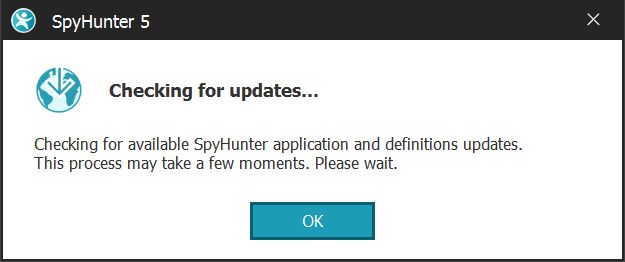
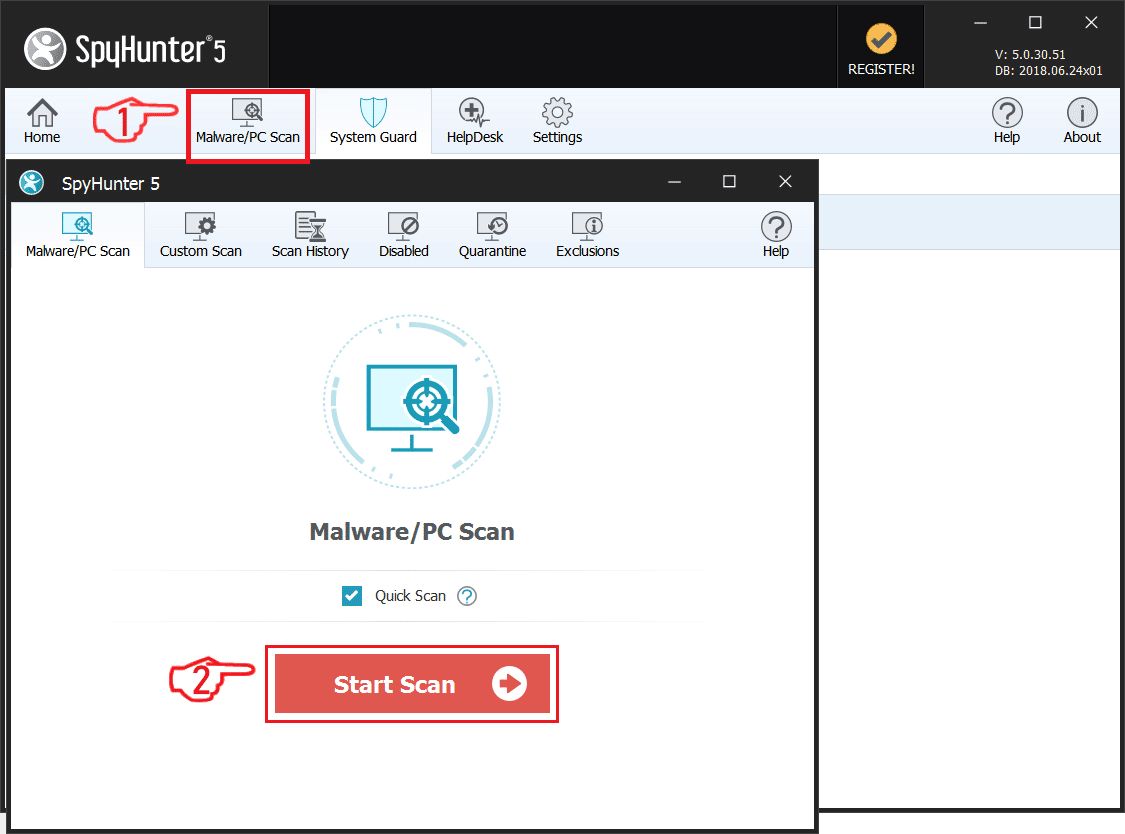
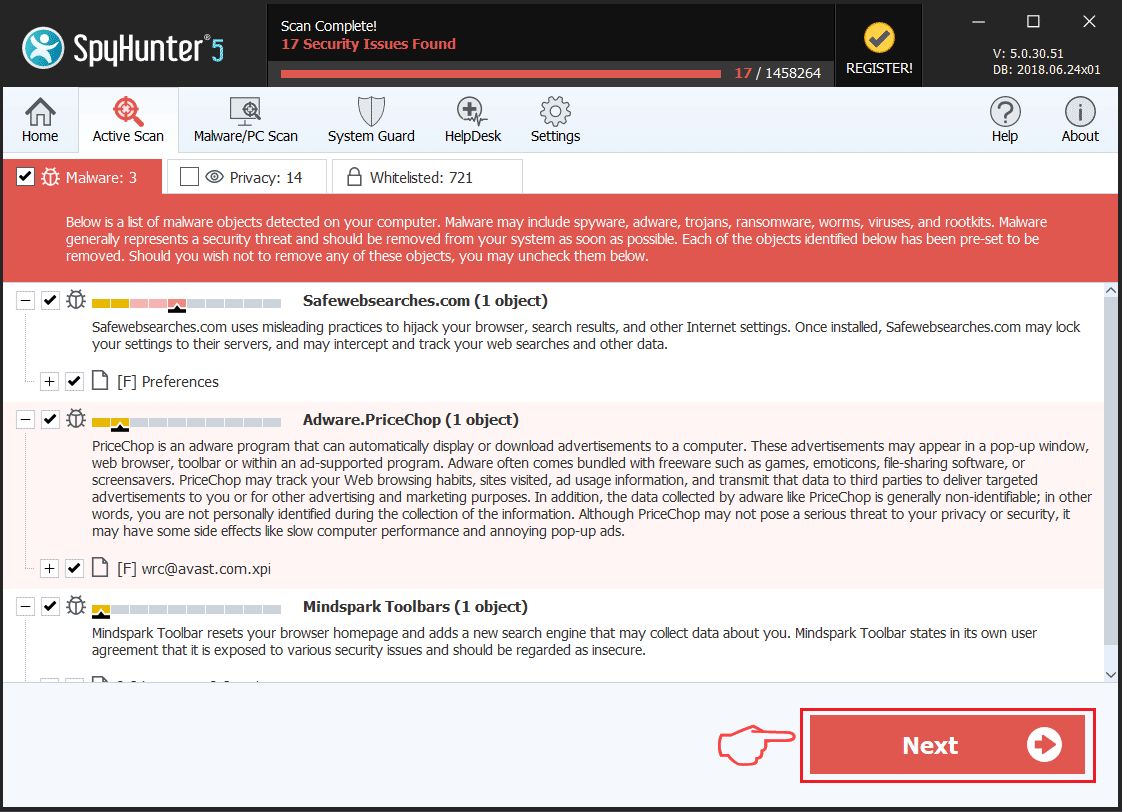
Ransomware Automatic Removal - Video Guide
Step 2: Uninstall GandCrab 3 and related malware from Windows
Here is a method in few easy steps that should be able to uninstall most programs. No matter if you are using Windows 10, 8, 7, Vista or XP, those steps will get the job done. Dragging the program or its folder to the recycle bin can be a very bad decision. If you do that, bits and pieces of the program are left behind, and that can lead to unstable work of your PC, errors with the file type associations and other unpleasant activities. The proper way to get a program off your computer is to Uninstall it. To do that:

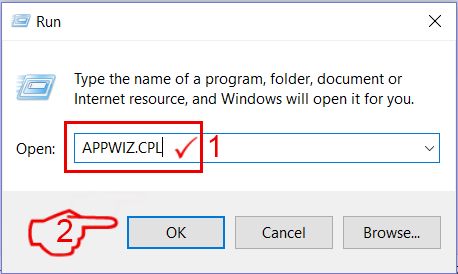
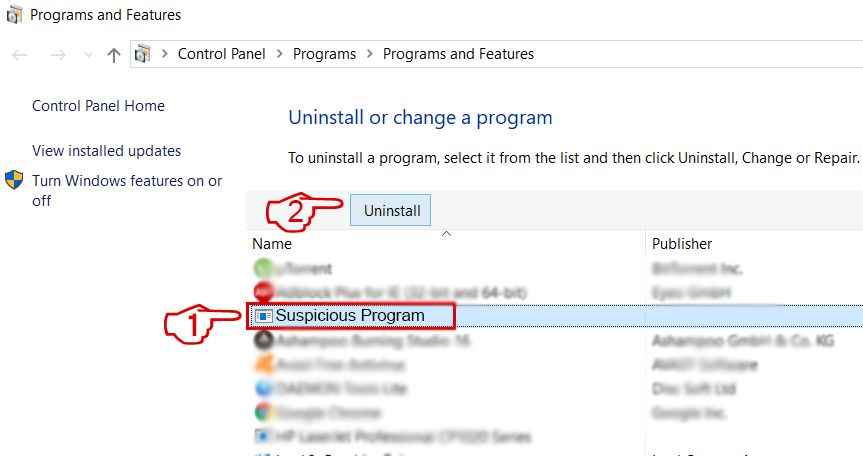 Follow the instructions above and you will successfully delete most unwanted and malicious programs.
Follow the instructions above and you will successfully delete most unwanted and malicious programs.
Step 3: Clean any registries, created by GandCrab 3 on your computer.
The usually targeted registries of Windows machines are the following:
- HKEY_LOCAL_MACHINE\Software\Microsoft\Windows\CurrentVersion\Run
- HKEY_CURRENT_USER\Software\Microsoft\Windows\CurrentVersion\Run
- HKEY_LOCAL_MACHINE\Software\Microsoft\Windows\CurrentVersion\RunOnce
- HKEY_CURRENT_USER\Software\Microsoft\Windows\CurrentVersion\RunOnce
You can access them by opening the Windows registry editor and deleting any values, created by GandCrab 3 there. This can happen by following the steps underneath:
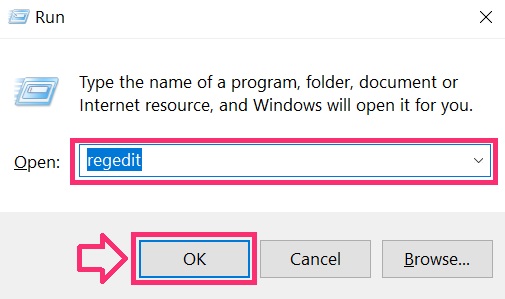

 Tip: To find a virus-created value, you can right-click on it and click "Modify" to see which file it is set to run. If this is the virus file location, remove the value.
Tip: To find a virus-created value, you can right-click on it and click "Modify" to see which file it is set to run. If this is the virus file location, remove the value.
Before starting "Step 4", please boot back into Normal mode, in case you are currently in Safe Mode.
This will enable you to install and use SpyHunter 5 successfully.
Step 4: Boot Your PC In Safe Mode to isolate and remove GandCrab 3

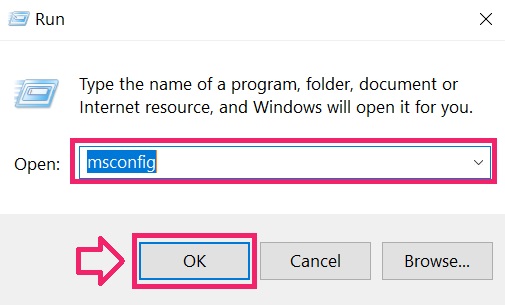
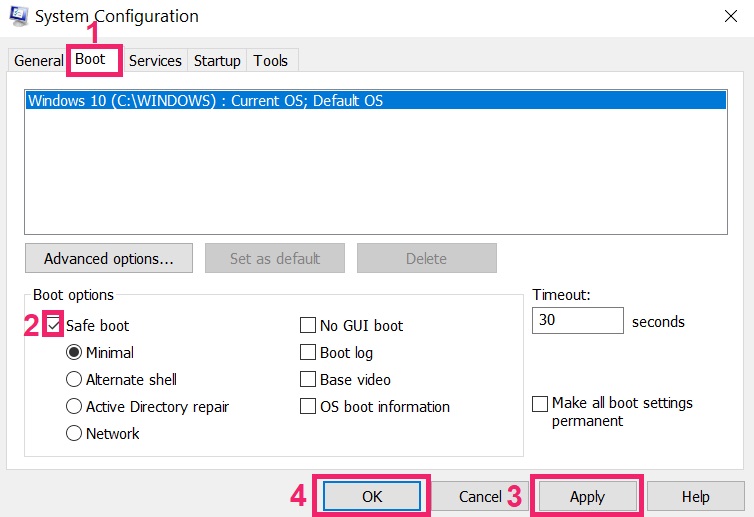
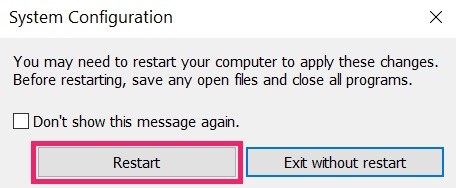
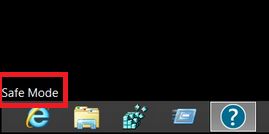
Step 5: Try to Restore Files Encrypted by GandCrab 3.
Method 1: Use STOP Decrypter by Emsisoft.
Not all variants of this ransomware can be decrypted for free, but we have added the decryptor used by researchers that is often updated with the variants which become eventually decrypted. You can try and decrypt your files using the instructions below, but if they do not work, then unfortunately your variant of the ransomware virus is not decryptable.
Follow the instructions below to use the Emsisoft decrypter and decrypt your files for free. You can download the Emsisoft decryption tool linked here and then follow the steps provided below:
1 Right-click on the decrypter and click on Run as Administrator as shown below:
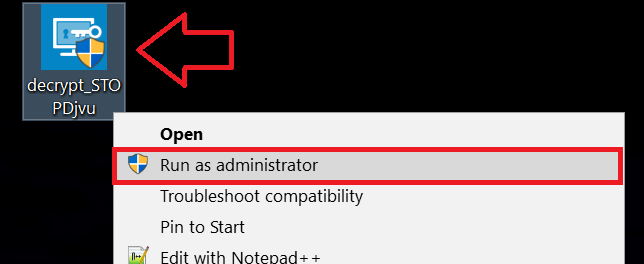
2. Agree with the license terms:
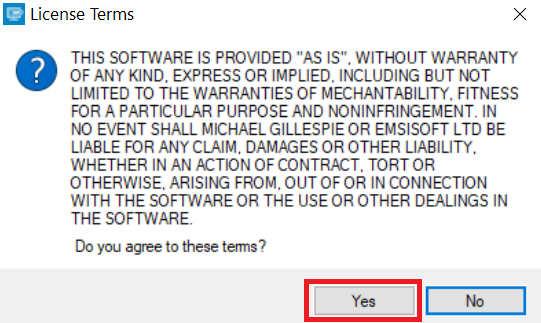
3. Click on "Add Folder" and then add the folders where you want files decrypted as shown underneath:
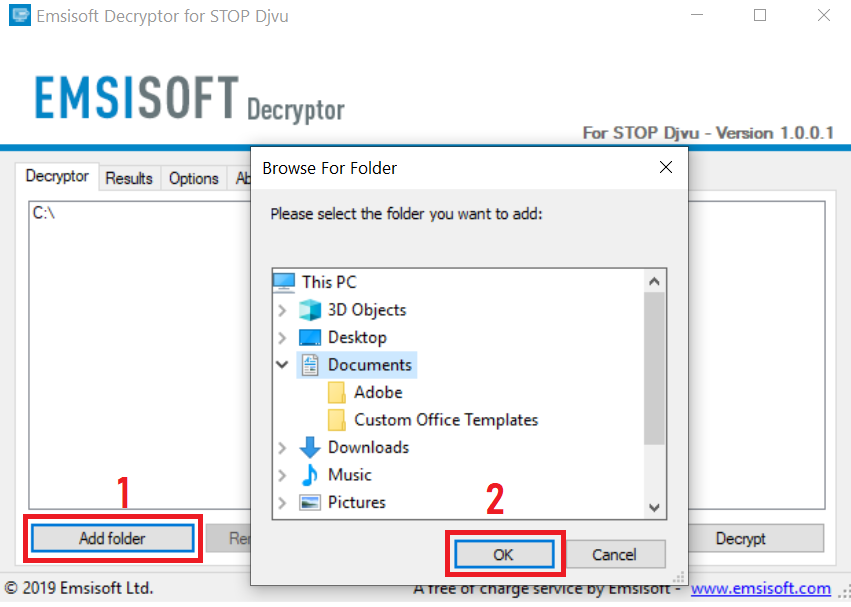
4. Click on "Decrypt" and wait for your files to be decoded.
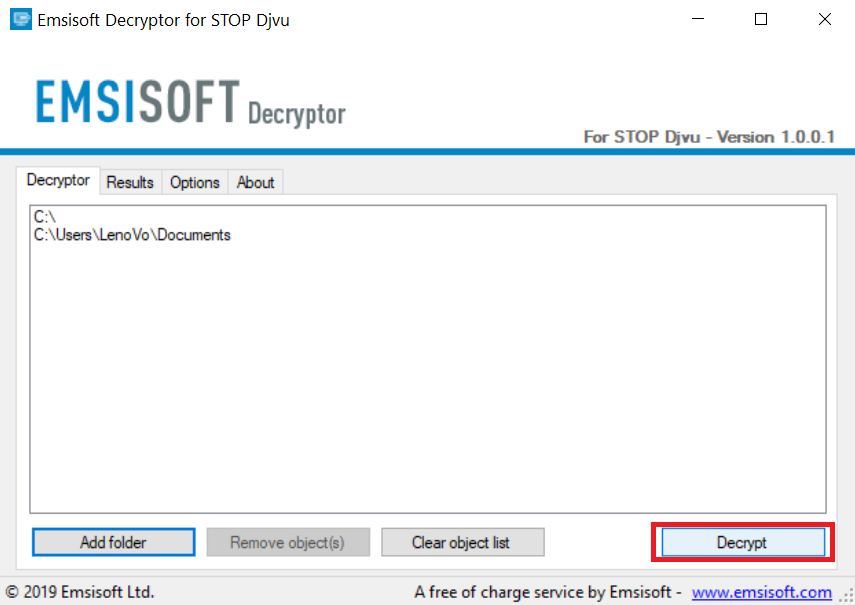
Note: Credit for the decryptor goes to Emsisoft researchers who have made the breakthrough with this virus.
Method 2: Use data recovery software
Ransomware infections and GandCrab 3 aim to encrypt your files using an encryption algorithm which may be very difficult to decrypt. This is why we have suggested a data recovery method that may help you go around direct decryption and try to restore your files. Bear in mind that this method may not be 100% effective but may also help you a little or a lot in different situations.
Simply click on the link and on the website menus on the top, choose Data Recovery - Data Recovery Wizard for Windows or Mac (depending on your OS), and then download and run the tool.
GandCrab 3-FAQ
What is GandCrab 3 Ransomware?
GandCrab 3 is a ransomware infection - the malicious software that enters your computer silently and blocks either access to the computer itself or encrypt your files.
Many ransomware viruses use sophisticated encryption algorithms to make your files inaccessible. The goal of ransomware infections is to demand that you pay a ransom payment to get access to your files back.
What Does GandCrab 3 Ransomware Do?
Ransomware in general is a malicious software that is designed to block access to your computer or files until a ransom is paid.
Ransomware viruses can also damage your system, corrupt data and delete files, resulting in the permanent loss of important files.
How Does GandCrab 3 Infect?
Via several ways.GandCrab 3 Ransomware infects computers by being sent via phishing emails, containing virus attachment. This attachment is usually masked as an important document, like an invoice, bank document or even a plane ticket and it looks very convincing to users.
Another way you may become a victim of GandCrab 3 is if you download a fake installer, crack or patch from a low reputation website or if you click on a virus link. Many users report getting a ransomware infection by downloading torrents.
How to Open .GandCrab 3 files?
You can't without a decryptor. At this point, the .GandCrab 3 files are encrypted. You can only open them once they are decrypted using a specific decryption key for the particular algorithm.
What to Do If a Decryptor Does Not Work?
Do not panic, and backup the files. If a decryptor did not decrypt your .GandCrab 3 files successfully, then do not despair, because this virus is still new.
Can I Restore ".GandCrab 3" Files?
Yes, sometimes files can be restored. We have suggested several file recovery methods that could work if you want to restore .GandCrab 3 files.
These methods are in no way 100% guaranteed that you will be able to get your files back. But if you have a backup, your chances of success are much greater.
How To Get Rid of GandCrab 3 Virus?
The safest way and the most efficient one for the removal of this ransomware infection is the use a professional anti-malware program.
It will scan for and locate GandCrab 3 ransomware and then remove it without causing any additional harm to your important .GandCrab 3 files.
Can I Report Ransomware to Authorities?
In case your computer got infected with a ransomware infection, you can report it to the local Police departments. It can help authorities worldwide track and determine the perpetrators behind the virus that has infected your computer.
Below, we have prepared a list with government websites, where you can file a report in case you are a victim of a cybercrime:
Cyber-security authorities, responsible for handling ransomware attack reports in different regions all over the world:
Germany - Offizielles Portal der deutschen Polizei
United States - IC3 Internet Crime Complaint Centre
United Kingdom - Action Fraud Police
France - Ministère de l'Intérieur
Italy - Polizia Di Stato
Spain - Policía Nacional
Netherlands - Politie
Poland - Policja
Portugal - Polícia Judiciária
Greece - Cyber Crime Unit (Hellenic Police)
India - Mumbai Police - CyberCrime Investigation Cell
Australia - Australian High Tech Crime Center
Reports may be responded to in different timeframes, depending on your local authorities.
Can You Stop Ransomware from Encrypting Your Files?
Yes, you can prevent ransomware. The best way to do this is to ensure your computer system is updated with the latest security patches, use a reputable anti-malware program and firewall, backup your important files frequently, and avoid clicking on malicious links or downloading unknown files.
Can GandCrab 3 Ransomware Steal Your Data?
Yes, in most cases ransomware will steal your information. It is a form of malware that steals data from a user's computer, encrypts it, and then demands a ransom in order to decrypt it.
In many cases, the malware authors or attackers will threaten to delete the data or publish it online unless the ransom is paid.
Can Ransomware Infect WiFi?
Yes, ransomware can infect WiFi networks, as malicious actors can use it to gain control of the network, steal confidential data, and lock out users. If a ransomware attack is successful, it could lead to a loss of service and/or data, and in some cases, financial losses.
Should I Pay Ransomware?
No, you should not pay ransomware extortionists. Paying them only encourages criminals and does not guarantee that the files or data will be restored. The better approach is to have a secure backup of important data and be vigilant about security in the first place.
What Happens If I Don't Pay Ransom?
If you don't pay the ransom, the hackers may still have access to your computer, data, or files and may continue to threaten to expose or delete them, or even use them to commit cybercrimes. In some cases, they may even continue to demand additional ransom payments.
Can a Ransomware Attack Be Detected?
Yes, ransomware can be detected. Anti-malware software and other advanced security tools can detect ransomware and alert the user when it is present on a machine.
It is important to stay up-to-date on the latest security measures and to keep security software updated to ensure ransomware can be detected and prevented.
Do Ransomware Criminals Get Caught?
Yes, ransomware criminals do get caught. Law enforcement agencies, such as the FBI, Interpol and others have been successful in tracking down and prosecuting ransomware criminals in the US and other countries. As ransomware threats continue to increase, so does the enforcement activity.
About the GandCrab 3 Research
The content we publish on SensorsTechForum.com, this GandCrab 3 how-to removal guide included, is the outcome of extensive research, hard work and our team’s devotion to help you remove the specific malware and restore your encrypted files.
How did we conduct the research on this ransomware?
Our research is based on an independent investigation. We are in contact with independent security researchers, and as such, we receive daily updates on the latest malware and ransomware definitions.
Furthermore, the research behind the GandCrab 3 ransomware threat is backed with VirusTotal and the NoMoreRansom project.
To better understand the ransomware threat, please refer to the following articles which provide knowledgeable details.
As a site that has been dedicated to providing free removal instructions for ransomware and malware since 2014, SensorsTechForum’s recommendation is to only pay attention to trustworthy sources.
How to recognize trustworthy sources:
- Always check "About Us" web page.
- Profile of the content creator.
- Make sure that real people are behind the site and not fake names and profiles.
- Verify Facebook, LinkedIn and Twitter personal profiles.



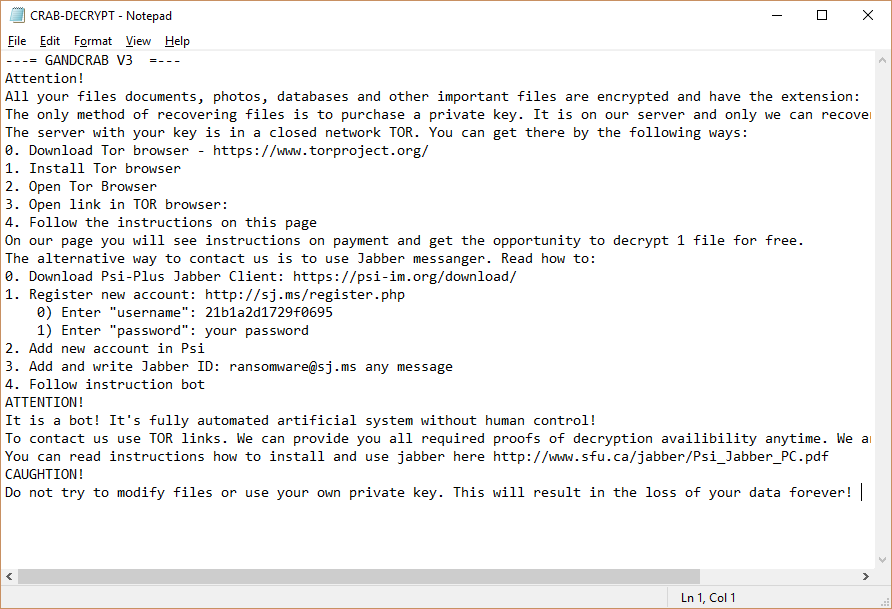

hey i am affected by GnadCrab 3, all my dat has been encrypted. I have followed your steps and tried to remove it from the root,but still i am not able to get restore my encrypted files back,please do help me..
Hello Kandarp,
At the moment there are no decryptors available for this particular strain of GandCrab. If you have been able to recover your files and used the anti-spyware solution in our instructions then you should not worry about the infection. Our detailed description of the virus’s behaviour and the necessary removal steps should help you take back control of the infected machine. Remember that you need to run the software in the particular order: first the anti-spyware program needs to remove the virus code, after that the data recovery tool can help restore your files.
Hallo Martin, gibt es Stand 28.05. einen Decryptor für Crandcrab v3?
i cant fix my proplem please help mu
Hola!! Se acaba de infectar mi notbook con GandCrab v3, pero estaba recien formateada la pc. Cuando quiero volver a formatear para instalar el S.O de nuevo, no me permite bootear ni entrar al setup. Que puedo hacer??? Agradeceria toda ayuda…!!
Estimados,
Alguna solución para restaurar archivos encriptados con Gandcrab v3.??